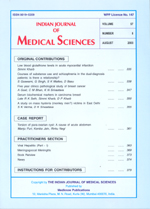
|
Indian Journal of Medical Sciences
Medknow Publications on behalf of Indian Journal of Medical Sciences Trust
ISSN: 0019-5359
EISSN: 0019-5359
Vol. 58, No. 11, 2004, pp. 478-484
|
 Bioline Code: ms04079
Bioline Code: ms04079
Full paper language: English
Document type: Research Article
Document available free of charge
|
|
|
Indian Journal of Medical Sciences, Vol. 58, No. 11, 2004, pp. 478-484
| en |
Induced abortion and concurrent adoption of contraception in the rural areas of India (An ICMR task force study)
Dhillon BS, Chandhiok N, Kambo I, Saxena NC
Abstract
BACKGROUND:
Despite a liberal Medical Termination of Pregnancy (MTP) act and awareness of family planning, maternal mortality attributable to induced abortion is high.
AIMS:
Assess attitude, behavior, practices and utilization of services by rural women for induced abortion and concurrent acceptance of contraception.
SETTINGS AND DESIGN:
Cross sectional survey of eligible married women in 13 states in India over one year.
MATERIAL AND METHODS:
A total of 1851 women who had an induced abortion during the previous 3 years were interviewed.
STATISTICAL ANALYSIS USED:
Includes proportions, rates and chi-square test.
RESULTS:
The main reason for seeking abortion was "don′t need any more children" (42%), and in 12.4 per cent they specifically mentioned that they "don′t need any more daughters". Around 46% of women accessed abortion services from private clinics as compared to government hospital (37.1%) and Primary Health Centre/Community Health Centre (14.0%). The decision to terminate the pregnancy and place of abortion was made by the husband in 42.8% and 52.5% respectively. Regret for abortion was expressed by 29.6% of the women. However, only 7.2% said they would not advice others for induced abortion. Nearly one half of the women undergoing abortion accepted a family planning method concurrently; of these Intra Uterine Device/oral contraceptives and a permanent method was adopted by 37.2% and 49.1% respectively. Acceptance of vasectomy by male partner was found to be low (1.3%). "Husband objected" (32.3%) was the main reason for not accepting post abortal contraception. Majority of the acceptors said they would recommend to others the same place where they had undergone abortion, thus indicating their satisfaction with the source and services received.
CONCLUSIONS:
Counselling for post-abortal contraceptive should be provided to the couple so that they can make an informed choice.
Keywords
Induced, abortion, contraception, rural, India
|
| |
© Copyright 2004 Indian Journal of Medical Sciences.
Alternative site location: http://www.indianjmedsci.org/
|
|
